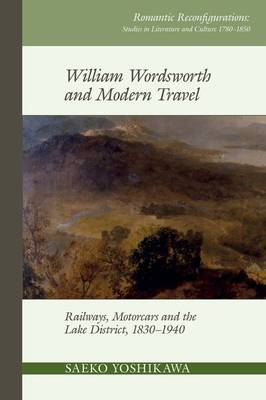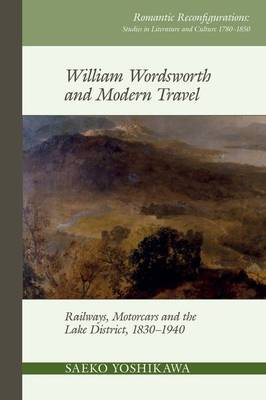
Door een staking bij bpost kan je online bestelling op dit moment iets langer onderweg zijn dan voorzien. Dringend iets nodig? Onze winkels ontvangen jou met open armen!
- Afhalen na 1 uur in een winkel met voorraad
- Gratis thuislevering in België vanaf € 30
- Ruim aanbod met 7 miljoen producten
Door een staking bij bpost kan je online bestelling op dit moment iets langer onderweg zijn dan voorzien. Dringend iets nodig? Onze winkels ontvangen jou met open armen!
- Afhalen na 1 uur in een winkel met voorraad
- Gratis thuislevering in België vanaf € 30
- Ruim aanbod met 7 miljoen producten
Zoeken
William Wordsworth and Modern Travel
Railways, Motorcars and the Lake District, 1830-1940
Saeko Yoshikawa
Hardcover | Engels | Romantic Reconfigurations: Studies in Literature and Culture 1780-1850 | nr. 12
€ 254,45
+ 508 punten
Uitvoering
Omschrijving
This book explores Wordsworth's extraordinary influence on the tourist landscapes of the Lake District throughout the age of railways, motorcars and the First World War. It reveals how Wordsworth's response to railways was not a straightforward matter of opposition and protest; his ideas were taken up by both advocates and opponents of railways, and through their controversies had a surprising impact on the earliest motorists as they sought a language to describe the liberty and independence of their new mode of transport. Once the age of motoring was underway, the outbreak of the First World War encouraged British people to connect Wordsworth's patriotic passion with his wish to protect the Lake District as a national heritage - a transition that would have momentous effects in the interwar period, when popular motoring paradoxically brought a vogue for open-air activities and a renewal of romantic pedestrianism. With the arrival of global tourism, preservation of the cultural landscape of the Lake District became an urgent national and international concern. This book explores how patterns of tourist behaviour and environmental awareness changed in the century of popular tourism, examining how Wordsworth's vision and language shaped modern ideas of travel, self-reliance, landscape and environment, cultural heritage, preservation and accessibility.
Specificaties
Betrokkenen
- Auteur(s):
- Uitgeverij:
Inhoud
- Aantal bladzijden:
- 304
- Taal:
- Engels
- Reeks:
- Reeksnummer:
- nr. 12
Eigenschappen
- Productcode (EAN):
- 9781789621181
- Verschijningsdatum:
- 7/05/2020
- Uitvoering:
- Hardcover
- Formaat:
- Genaaid
- Afmetingen:
- 160 mm x 234 mm
- Gewicht:
- 589 g

Alleen bij Standaard Boekhandel
+ 508 punten op je klantenkaart van Standaard Boekhandel
Beoordelingen
We publiceren alleen reviews die voldoen aan de voorwaarden voor reviews. Bekijk onze voorwaarden voor reviews.











